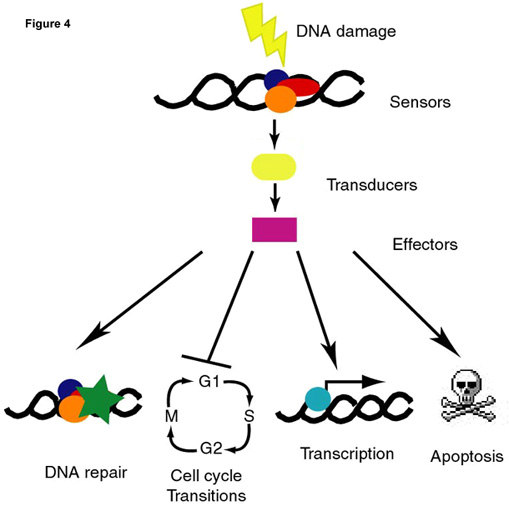
The stability of the genome is essential for the proper function and survival of all organisms. DNA damage is very frequent and appears to be a fundamental problem for life. DNA damage can trigger the development of cancer, and accelerate aging. Most DNA damage is removed by DNA repair enzymes, but these repair processes are not completely efficient. DNA damage, if not repaired, causes errors during DNA synthesis leading to mutations that can give rise to cancer.
Cell cycle checkpoints are regulatory pathways that govern the order and timing of cell cycle transitions to ensure completion of one cellular event prior to another. Upon sensing DNA damage, cell cycle checkpoints are activated to arrest cell cycle progression to allow time for repair before the damage is passed on to the cells. In addition to checkpoint activation, the DNA damage response leads to induction of transcriptional programs, enhancement of DNA repair pathways, and when the level of damage is severe, to initiation of apoptosis.
The key regulators of the checkpoint pathways in the DNA damage response are the ATM (ataxia telangiectasia, mutated) and ATR (ATM and Rad3-related) protein kinases. These proteins are central to the entire DNA damage response. Both of these proteins belong to an unique family of serine-threonine kinases characterized by a C-terminal catalytic motif containing a phosphatidylinositol 3-kinase domain. Although ATM and ATR appear to phosphorylate many of the same cellular substrates, they generally respond to distinct types of DNA damage. For example, ATM is the primary mediator of the response to DNA double strand breaks (DSBs) that can arise by exposure to ionizing radiation (IR). Cells lacking ATM have major problems in repairing DSBs and sustain major chromosome instability. On the other hand, ATR directs the principle response to UV damage. Downstream of these proteins are two families of checkpoint kinases (CHK), the Chk1 and Chk2 kinases, and their homologues. These kinases carry out subsets of the DNA damage response and are targets of regulation by ATM and ATR kinases.
Depending on the type of cells, amount, and location, DNA damage has been shown to be involved in a variety of disorders in aging, and in carcinogenesis. The development of cancer and the process of aging can be delayed by reducing the load of DNA.
Projects
The laboratory is currently studying projects that implicate protein methylation in the DNA damage response.